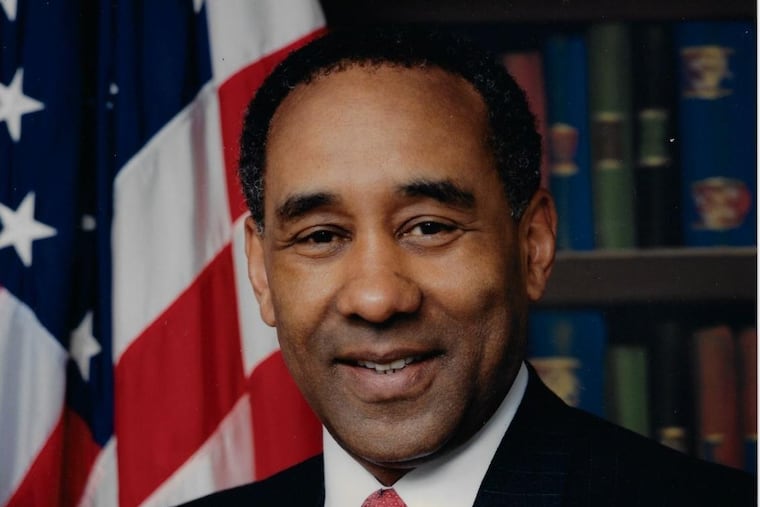Wayne G. Davis, who led FBI offices in Indianapolis, Detroit, and Philadelphia, dies at 81
Mr. Davis was one of several men who broke the color barrier by graduating from the FBI Academy in 1962 and 1963. He went on to a distinguished career as an FBI agent and head of the bureau's offices in Detroit, Indianapolis, and Philadelphia.

Wayne G. Davis, 81, of Ardmore, an executive who as special agent in charge of the FBI’s offices in Indianapolis, Detroit, and Philadelphia was among the highest-ranking African Americans to hold power within the national law enforcement agency, died Thursday, July 9, of amyloidosis at home.
Mr. Davis was diagnosed in 2017 with the disease, in which an abnormal protein harms tissues and organs.
His career at the FBI lasted from 1963 to 1988. He and three other African Americans became trailblazers when they broke through a 40-year color barrier to graduate from the FBI Academy in 1962 and 1963. Previously, no Black people had been permitted to enroll in the academy.
His appointment was historically significant because at that time, FBI Director J. Edgar Hoover was under pressure from U.S. Attorney General Robert F. Kennedy and the Department of Justice to racially integrate the professional ranks of the bureau, according to Jerri Williams, who served as Mr. Davis’ media specialist while he was in Philadelphia.
In August 1963, Mr. Davis began his duties as an FBI agent. After completing three months of special training at the FBI Academy, he was given a succession of assignments in Detroit, Newark, and Washington. Hoover recognized him for outstanding job performance during his two years in Detroit.
Among his accomplishments were overseeing the probe into the shooting of National Urban League president Vernon Jordan in 1980. Jordan was shot in the back in a Fort Wayne, Ind., motel parking lot and survived. Joseph P. Franklin, an avowed racist, was arrested in connection with the crime, but was acquitted.
In 1981, while in charge of the Indianapolis office, he was reassigned to Detroit as special agent in charge, the first Black person to hold the post.
“I’m just looking forward to learning what the office is about, what investigative matters are taking precedence,” he told the Detroit News in February 1981. “It’s not really a matter of what I can do. The agents are the ones who get the job done.”
In 1985, he was assigned to head the Philadelphia office, responsible for Southeastern Pennsylvania and South Jersey.
“Wayne’s promotions to special agent in charge of the Detroit and Philadelphia offices made him one of the highest-ranking Black agents in a well-earned position of authority in the FBI,” Williams wrote in a tribute. “Considering the times we are living in today, with tensions between the Black community and law enforcement, Wayne Davis’ life and career is something we can all celebrate.”
Mr. Davis believed the FBI should reflect the nation and have a diverse workforce. After Hoover’s death in 1972, Mr. Davis served as the bureau’s equal employment opportunity officer until being named chief of its applicant and placement unit in 1975.
He led efforts to hire women and agents of color. “Throughout his career, he mentored special agents of color who joined the bureau after him and advocated for women agents,” Williams said.
Born in New York City to Sirlester Carl and Ione Veasey Davis, he attended public school there before earning a bachelor of science degree in business administration in 1960 from the University of Connecticut, where he played basketball and ran track.
While in college, he met and married Lois Waters. After graduation, he served stateside in the Army. He was honorably discharged in 1963 as a first lieutenant.
He received the 1986 Attorney General’s Award for Equal Employment Opportunity for providing an atmosphere of fairness in FBI offices he headed. On Feb. 28, 2008, in connection with African American History Month, he was honored by the U.S. Attorney’s Office for the Eastern District of New York as a recipient of its “FBI Trailblazer” Award.
After retiring from the FBI in 1988, he spent a decade as director of corporate security for Rohm & Haas Co.
He enjoyed photography and was vice chairman of the Lower Merion Civil Service Commission. He was a longtime member of Grace Baptist Church of Germantown.
Besides his wife, Lois, he is survived by daughters Adrienne and Cheryl, two grandchildren, and a brother.
Services were private. A memorial event will be held later.
Donations may be made to A Better Chance in Lower Merion, Box 213, Ardmore, Pa., 19003.